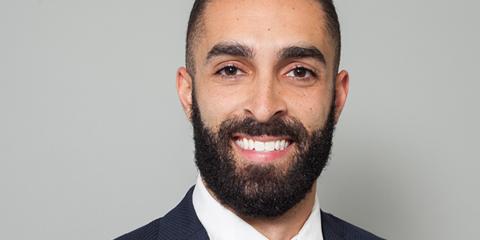Q&A with Taylor Stilson

Taylor Stilson received an M.M. in vocal pedagogy with collaborative piano studies and a B.M. in vocal performance from Boston Conservatory, and joined the school's faculty in 2018. He maintains a unique career as vocal pedagogue, singer, and yogic practitioner, and presents his research on muscle tension dysphonia at universities all over the East Coast. Learn more about Stilson’s career.
When did you know you wanted to study vocal pedagogy?
Vocal pedagogy has always fascinated me. I've struggled with a cognitive disorder in which my mind's eye cannot visualize, a term science has recently coined aphantasia, and I found antiquated teaching models to work to my disadvantage. I always wanted to become my own best teacher, so having a concrete grasp on the structure and function of the singing mechanism was very important to me.
What is muscle tension dysphonia (MTD), and what drew you to this particular area of research?
Muscle tension dysphonia is a muscle compensatory response in the larynx and surrounding accessory structures. I’ve been interested in this area of research because I have experienced significant MTD in my performing career and, as a teacher, I have found few easily accessible treatments of MTD for the teaching studio.
How does a singer develop MTD? How common is it among singers?
MTD can be caused by depression, a significant emotional experience, anxiety, technical issues, reflux, vocal fold pathology, or illness. And, if I can be honest and realistic, what singer hasn't experienced one or more of these? In my professional experience, MTD is as prevalent as the common cold, but with a good singing technique, can be alleviated rather quickly.
What are the symptoms of MTD?
The complexities of the larynx are still being explored in the voice science community. The larynx is a complex valve that has an incredible adaptation threshold and thus responds intricately to environmental, neurological, gastrointestinal, and skeletomuscular stimuli. Symptoms can include voice loss, pain while singing, loss of resonance, and globus (the sensation of having a lump in the throat—a symptom I experienced for many years and until recently knew very little about).
What type of research do you conduct in this area?
I have not conducted my own Internal Review Board-certified research in this field to date, but due to my anxiety-induced MTD, I have spent the last year incorporating hypnosis into my singing and performing practices. Hypnosis has been found to reroute the over-firing of the brain's emotional centers and numerous studies have shown the efficacy of anxiety reduction and performance enhancement.
What is your advice for someone who suspects they might have MTD, or for a teacher who suspects a student may have MTD?
In order to treat the cause of MTD, it is important to observe and diagnose the patterns associated with the disorder. MTD can only be diagnosed by a trained medical professional such as an ear, nose, and throat (ENT) doctor or a speech language pathologist (SLP). In the real world, telling students to get scoped every time they exhibit symptoms of MTD is unrealistic. Thus, as a studio teacher, it is important to understand the causes, listen for the symptoms, and have a basic toolbox to treat the systems.
Easily observable for a voice teacher are a loss of resonance, similar to white noise in the timbre, phonation discomfort, excessive extrinsic laryngeal muscle tension, and general vocal hyperfunction. Studio-applicable treatments can include stregga (an Italian term used throughout historic vocal pedagogy that involves the activation of the very area in the supraglottal region that is a typical symptom of MTD), massaging the macrostructures of the larynx and surrounding neck and strap muscles, exercises that release the articulators (such as singing with the tongue over a straw), singing while moving the head in various up and down, left and right patterns, and making tiny phonatory sounds. These, pulled from various medically sound rehabilitation modules, have proven very effective for me as a teacher in reducing the symptoms of MTD.
What is your favorite memory from a voice lesson, either as the student or a teacher?
As an undergraduate student I texted my voice teacher at the time, Kevin Wilson, complaining of intestinal pain and high fever. My mother told me to wait it out until the morning but my teacher called me and said, "I will be at your apartment in five minutes—you probably have appendicitis and it'll burst if we don't get you to the hospital soon!" I joke with him now because not only was he a phenomenal pedagogy mentor to me, but he also essentially saved my life!
